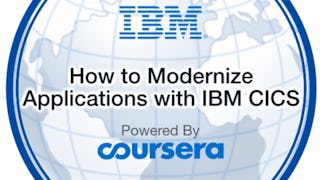- Browse
- Image Processing
Results for "image processing"
 Status: Free TrialFree Trial
Status: Free TrialFree TrialSkills you'll gain: OpenAI API, OpenAI, Image Analysis, Generative AI, ChatGPT, LLM Application, Multimodal Prompts, Application Programming Interface (API), Large Language Modeling, Artificial Intelligence, Natural Language Processing, Computer Vision
Beginner · Course · 1 - 4 Weeks
 Status: NewNewStatus: Free TrialFree Trial
Status: NewNewStatus: Free TrialFree TrialSkills you'll gain: Bash (Scripting Language), Shell Script, Linux, Scripting, Linux Commands, Linux Administration, Unix Shell, Operating System Administration, Data Persistence, Unix Commands, Systems Administration, Command-Line Interface, IT Automation, Unix, Cloud Hosting, Object-Relational Mapping, YAML, Python Programming, File Transfer Protocol (FTP), Automation
5·Rating, 5 out of 5 stars31 reviewsBeginner · Specialization · 3 - 6 Months
 Status: Free TrialFree TrialU
Status: Free TrialFree TrialUUniversity of Colorado Boulder
Skills you'll gain: Web Scraping, Data Integration, Data Cleansing, Data Import/Export, Data Quality, Data Preprocessing, Data Collection, Data Wrangling, Data Manipulation, SQL, MySQL, Databases, Query Languages, Pandas (Python Package), Application Programming Interface (API)
4.6·Rating, 4.6 out of 5 stars14 reviewsIntermediate · Course · 1 - 3 Months
 Status: PreviewPreview
Status: PreviewPreviewSkills you'll gain: Transaction Processing, Hybrid Cloud Computing, COBOL (Programming Language), Mainframe Technologies, Mainframe Computing, IBM Cloud, Cloud Applications, Enterprise Application Management, Application Servers, Application Development, Application Programming Interface (API), Middleware, Business Logic
4.5·Rating, 4.5 out of 5 stars16 reviewsIntermediate · Course · 1 - 4 Weeks
 Status: Free TrialFree TrialL
Status: Free TrialFree TrialLLearnKartS
Skills you'll gain: Prompt Engineering, Amazon Bedrock, Retrieval-Augmented Generation, AWS SageMaker, AWS Identity and Access Management (IAM), Identity and Access Management, Generative AI, Multimodal Prompts, Data Preprocessing, Computer Vision, AI Security, Model Evaluation, Amazon Web Services, Natural Language Processing, Machine Learning, LLM Application, Reinforcement Learning, Data Ethics, Deep Learning, Data Wrangling
4.3·Rating, 4.3 out of 5 stars9 reviewsBeginner · Specialization · 1 - 3 Months
 Status: Free TrialFree TrialU
Status: Free TrialFree TrialUUniversity of Colorado Boulder
Skills you'll gain: Community Outreach, Social Justice, Diversity Awareness, Overcoming Obstacles, Advocacy, Community Development, Empowerment, Action Oriented, Persistence, Self-Awareness, Planning
5·Rating, 5 out of 5 stars15 reviewsIntermediate · Course · 1 - 4 Weeks
 Status: Free TrialFree TrialA
Status: Free TrialFree TrialAAmazon
Skills you'll gain: Full-Stack Web Development, Restful API, Cloud Deployment, Front-End Web Development, HTML and CSS, Data Persistence, Application Programming Interface (API), Server Side, Java Platform Enterprise Edition (J2EE), Web Applications, Secure Coding, Amazon Elastic Compute Cloud, Back-End Web Development, Spring Boot, Model View Controller, Responsive Web Design, Javascript
4.1·Rating, 4.1 out of 5 stars40 reviewsBeginner · Course · 1 - 4 Weeks
 Status: Free TrialFree TrialL
Status: Free TrialFree TrialLL&T EduTech
Skills you'll gain: Engineering Drawings, Construction Engineering, Hydraulics, Mechanical Design, Blueprint Reading, Petroleum Industry, Building Codes, Process Flow Diagrams, Civil Engineering, Oil and Gas, Construction Inspection, Failure Analysis, Construction, Engineering Analysis, Engineering Calculations, Engineering Plans And Specifications, Energy and Utilities, Mechanical Engineering, Chemical Engineering, Process Engineering
4.4·Rating, 4.4 out of 5 stars129 reviewsIntermediate · Specialization · 3 - 6 Months
 Status: PreviewPreviewU
Status: PreviewPreviewUUniversidad Nacional Autónoma de México
Skills you'll gain: Oncology, Patient Evaluation, Diagnostic Tests, Radiation Therapy, Pathology, Pain Management, Urology, Medical Imaging, Risk Analysis, Anatomy, Treatment Planning, Epidemiology, Surgery, Physiology, Pharmacotherapy
4.8·Rating, 4.8 out of 5 stars171 reviewsBeginner · Course · 1 - 4 Weeks
 Status: NewNew
Status: NewNewSkills you'll gain: Storytelling, Adobe Firefly, Marketing Design, Color Theory, Image Quality, Creative Thinking, Creative Problem-Solving
Beginner · Course · 1 - 4 Weeks
 Status: PreviewPreview
Status: PreviewPreviewSkills you'll gain: Generative AI, Generative Model Architectures, Model Deployment, Image Analysis, Cloud Deployment, Unsupervised Learning
Beginner · Course · 1 - 4 Weeks
 Status: Free TrialFree TrialT
Status: Free TrialFree TrialTTecnológico de Monterrey
Skills you'll gain: Search Engine Marketing, Customer Engagement, Brand Management, Digital Media Strategy, Search Engine Optimization, Target Market, Digital Marketing, Web Analytics and SEO, Marketing Communications, Digital Advertising, Social Media Strategy, Digital Transformation, Customer Retention, Content Strategy, Marketing Analytics, Marketing Strategies, Social Media Marketing, Lead Generation, Customer Acquisition Management, Email Marketing
4.8·Rating, 4.8 out of 5 stars248 reviewsIntermediate · Specialization · 1 - 3 Months
In summary, here are 10 of our most popular image processing courses
- Multimodal Generative AI: Vision, Speech, and Assistants: Codio
- Linux & Python Automation with Bash Scripting: EDUCBA
- Data Collection and Integration: University of Colorado Boulder
- How to Modernize applications with IBM CICS: IBM
- AWS AI Practitioner Certification Prep: LearnKartS
- Anti-Racism III: University of Colorado Boulder
- Full Stack Web Development: Amazon
- Design of Industrial Piping Systems: L&T EduTech
- Cáncer de próstata: Universidad Nacional Autónoma de México
- Getting started with compositing in Adobe Photoshop: Adobe










